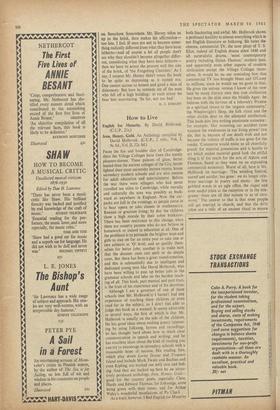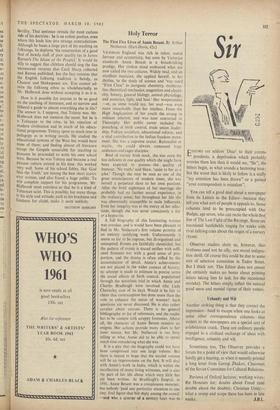How to Live
English for Maturity. By David Holbrook. (C.U.P., 21s.)
FROM the fen and boulder clay of Cambridge- shire the Village Colleges have risen like stately pleasure-domes. These palaces of glass, better heated than the ancient colleges of the City, better lighted than most university lecture rooms, house secondary modern schools and are also centres for adult education and entertainment. Before the war there were villagers who had never travelled ten miles to Cambridge, while morally and culturally the area was possibly as back- ward as anywhere in England. Now the car- parks are full in the evenings, as people come in to hear opera or take classes in mathematics. Russian or gracious living; by day the children show a high morale by their sober briskness. There has been resistance to this change, since there are country parents who do not believe in homework or indeed in education at all. One of the problems is to persuade the brighter boys and girls to stay on for an extra year to take one or two subjects at '0' level, and so qualify them- selves for better jobs; another is to make sure that the dimmer ones can spell or do simple sums. But there has been a great transformation, and this is substantially due to intelligent and dedicated young men like David Holbrook, who have been willing to pass up better jobs in the grammar schools and take on the hardest teach- ing of all. This book, part manual and part tract, is the fruit of his experience and of his devotion.
Although I am a governor of one of these schools (not Mr. Holbrook's) I haven't had any experience of teaching these children or even read far in the subject, so I don't feel able to judge this book as a manual. It seems admirable in several ways, the first of which is that Mr. Holbrook is usually on the side of the children. He has good ideas about making poetry interest- ing by using folksong, hymns and recordings; he has thought hard about how to teach clear communication in speech and writing; and he has excellent ideas about the kind of reading you can try to encourage in secondary schools with a reasonable hope of success. His reading lists, which play down Lorna Doane and Treasure Island and include Mark Twain and Buchan and even Kipling, are worked out with care and feel- ing. And they are backed up here by an attrac- tively produced anthology, Iron. Honey. Gold— good for the country poets, especially Clare, Hardy and Edward Thomas; for folksongs, some being given with their tunes; and for Arthur Waley's wonderful translations of Po Chu-I.
As a tract, however. I find English for Maturity both fascinating and awful. Mr. Holbrook shows a profound hostility to almost everything which is not English literature or folksong. He hates the cinema, commercial TV, the later plays of T. S. Eliot, indeed all English drama since 1640 and all naturalistic drama, 'most contemporary poetry including Dylan Thomas,' modern jazz, and apparently most other aspects of modern civilisation except the Village Colleges them- selves. It would be no use reminding him that commercial TV has brought Ibsen and O'Casey to millions, since he would see no good in that. He gives the naivest version I know of the view held by many literary men that true civilisation has been on the slide since the Middle Ages: he believes with the fervour of a Jehovah's Witness in a spiritual return to the 'organic community,' the Wheelwright's Shop, the folk ritual and the other clichés dear to the alienated intellectual. This leads him into writing passionate nonsense: for example, 'Our mounting car accident rates measure the weaknesses in our living power' (we die, that is, because of our death wish and not because the volume of traffic is too great for the roads). 'Commerce would make us all cheerfully greedy for material possessions and is hostile to art which makes material greed look the pitiful thing it is' (so much for the arts of Atfrns and Florence, based as they were on an expanding commercial economy). Worst of all, here is Mr. Holbrook on marriage: 'The wedding festival, sacred and secular, has gone: we no longer cele- brate marriage in poetry and music: the few gabbled words in an ugly office, the risque and even sordid jokes at the reception or in the tele- grams--these are all that remain to us of cere- mony.' The answer to that is that most people still get married in church; and that the dirty jokes are a relic of an ancient ritual to ensure fertility. That sentence reveals the most curious side of his doctrine: be is an ardent puritan, even Where this leads him into strange contradictions. Although he bases a large part of his teaching on folksongs, he deplores 'the resurrection of a good deal of bawdy stuff of poor quality (as in lames Reeves's The Idiom of the People)? It would be silly to suggest that children should sing the fine uncensored versions that Cecil Sharp collected and Reeves published; but the fact remains that the English folksong tradition is bawdy, as Chaucer and Shakespeare are. You cannot ad- mire the folksong ethos as wholeheartedly as Mr. Holbrook does without accepting it as it is.
How is it possible for anyone to be so good on the teaching of literature, and so narrow and illiberal a guide to almost everything else in life? The answer is, I suppose, that Tolstoy was. Mr. Holbrook does not mention the name, but he is a Tolstoyan to the Ore, in his rejection of modern civilisation and in much of his educa- tional programme. Tolstoy spent as much time in Pedagogy as in writing novels. He studied the educational systems of the West but would have none of them; and finding almost all literature except the Gospels unsuitable for teaching to Peasants he proceeded to write his own school texts. Because he was Tolstoy and because a real peasant culture existed in his time, this worked very well. Some of his school fables. like 'God Sees the Truth,' are among the best short stories ever written, and also found a huge public. To win complete support for his programme, Mr. Holbrook must convince us that he is a kind of Tolstoyan saint. This is possible, but many things in his style and attitude, such as his brashness and fondness for cliché, make it seem unlikely.
toiSiTHEW HODGART







































 Previous page
Previous page